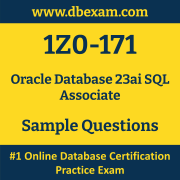 The Oracle Database ai SQL Associate (1Z0-171) Sample Question Set is designed to help you prepare for the Oracle Database 23ai SQL Associate certification exam. To become familiar with the actual Oracle Certification exam environment, we suggest you try our Sample Oracle 1Z0-171 Certification Practice Exam.
The Oracle Database ai SQL Associate (1Z0-171) Sample Question Set is designed to help you prepare for the Oracle Database 23ai SQL Associate certification exam. To become familiar with the actual Oracle Certification exam environment, we suggest you try our Sample Oracle 1Z0-171 Certification Practice Exam.
This Oracle Database 23ai SQL Associate certification sample practice test and sample question set are designed for evaluation purposes only. If you want to test your Oracle 1Z0-171 knowledge to identify your areas of improvement and get familiar with the actual exam format, we suggest you prepare with the Premium Oracle Database 23ai SQL Associate Certification Practice Exam. Our team of Oracle Development experts has designed Questions-Answers for this premium practice exam by collecting inputs from recently certified candidates. Our premium Oracle 1Z0-171 certification practice exam will boost your confidence as well as your actual Oracle Database ai SQL Associate exam result.
Oracle 1Z0-171 Sample Questions:
c) Table privilege
Answers:
|
Question: 01 Answer: b |
Question: 02 Answer: a |
Question: 03 Answer: c |
Question: 04 Answer: a |
Question: 05 Answer: b |
|
Question: 06 Answer: a |
Question: 07 Answer: c |
Question: 08 Answer: d |
Question: 09 Answer: c |
Question: 10 Answer: d |
